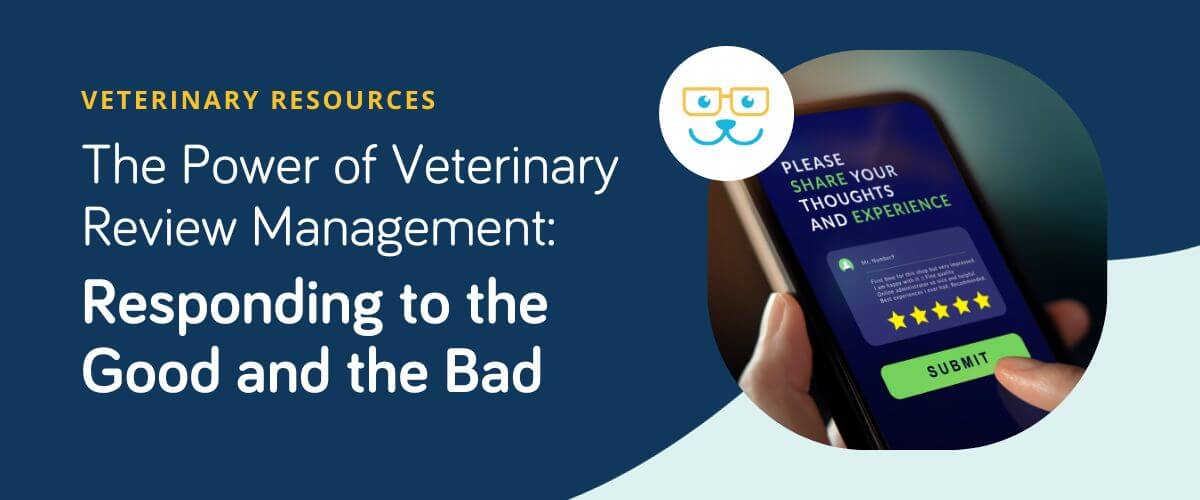The Power of Veterinary Review Management: Balancing the Good and the Bad
In the digital age, where the internet holds sway over the opinions and choices of millions, maintaining a realistic, positive online reputation is essential, especially for veterinary clinics. As a veterinary practice owner or manager, your online reputation is a critical component of your marketing strategy. One aspect of this strategy that is often overlooked but is undervalued is review management and responding to both positive and negative feedback.
The Impact of Review Management on Veterinary Clinics
Online reviews act as a digital word-of-mouth, shaping perceptions and influencing decisions. Today, nearly 90% of consumers read online reviews before making a purchase decision, including decisions about where to take their pets for medical care. For veterinary practices, this means that your online reputation can directly impact your ability to attract new clients and retain existing ones.

When potential clients search for a veterinary clinic, they are likely to come across a variety of reviews, from glowing testimonials to less-than-favorable experiences. This is where effective review management comes into play. Here's why it matters:
- Credibility: Responding to reviews, both positive and negative, demonstrates your clinic's commitment to customer service and the welfare of the animals you care for. It shows that you value feedback and take steps to address concerns.
- Improvement: Negative reviews can provide valuable insights into areas where your practice may need improvement. By addressing these concerns, you not only improve your clinic but also show potential clients that you are proactive in making changes.
- Build Trust: Engaging with reviews builds trust with your clients. When you acknowledge and respond to both positive and negative feedback, it humanizes your practice, making it more relatable and approachable.
Responding to Negative Reviews: A Delicate Art
Negative reviews can feel like a blow, but they offer insights for improvement and an opportunity to showcase professionalism. Negative reviews are inevitable, and striving for a perfect 5-star rating is not only unrealistic but also suspicious to consumers. Instead of trying to avoid negative reviews, focus on how you respond to them.
Follow these guidelines:
- Take a Day or So to Gather the Facts: When faced with negative feedback, take a step back, evaluate the concerns raised, and respond with tact and understanding. Take some time to investigate the issue, gather the facts, review records, and consult your team if necessary. This ensures that your response is well-informed and considerate.
- Respond Thoughtfully: Craft a thoughtful and empathetic response. Address the reviewer by name, if possible, and express your gratitude for their feedback. Apologize for any negative experiences they may have had.
- Don't Feed the Beast: Avoid engaging in a public back-and-forth with the reviewer. Instead, offer to take the conversation offline. Provide a phone number or email address where they can reach you directly. This demonstrates your willingness to address their concerns privately and professionally.
- Seek Resolution: In your response, express your commitment to resolving the issue. Offer a solution or ask how you can make amends. Encourage the reviewer to contact you directly to discuss the matter further.
- Ask for an Edit: If you are able to resolve the issue with the client, kindly request that they consider updating or editing their review to reflect the resolution. This can significantly impact the perception of your practice.

Remember, negative reviews are not the end of the world. In fact, they showcase your clinic's dedication to excellent customer service. When handled gracefully and professionally negative reviews can build your credibility and even turn into positive endorsements for your veterinary practice.
In a market swamped with options, veterinary review management is an essential aspect of your marketing strategy, and it isn’t going anywhere. Strive for excellence, but embrace authenticity. View both positive and negative reviews as opportunities for growth and improvement.

